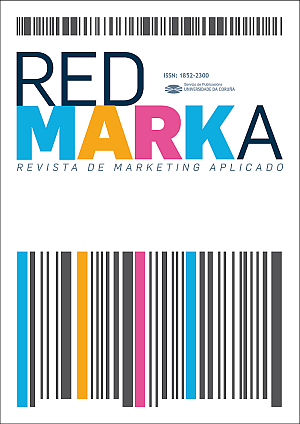Education potential of university webradio. an approach from the perspective of teachers and speakers.
Main Article Content
Abstract
Changes from analogical radio to webradio has involved an audible product updating that, with digital media elements incorporation, achieves a projection further of the audible field. Internet radio characteristics offers numerous potentials for university radios. Radio stations are living an exponential growth on the web and it pushes up new forms of creation, broadcast and diffusion. This paper aims to deepen in the possibilities that the web offers to college radio from an educational perspective and understanding the perceptions that students and teachers as a major public have in this field.
Keywords:
Downloads
Article Details
References
Albarran, A. & Pitts, G. (2001). Radio Broadcasting Industry. Boston. Allyn & Bacon.
Baker, A. (2010). REviewing net-only college radio: a case study of Brooklyn College Radio, Journal of Radio & Audio Media, 17 (1); pp. 109-125.
Corbett, J. (1993). Radio Dada Manifesto, Strauss, N. (ed.) Radio (text)e. Nueva York. Semiotexte; pp. 82-92.
Costa Filho, I. (2009). Ciberouvintes da Universidade Ferderal do Ceará: as contradições do uso social do rádio pela Internet, XI Congresso de Ciências da Comunicação na Região Nordeste. Intercom. Sociedade Brasileira de Estudos Interdisciplinares da Comunicação, [recuperado 23- 2-2011] de http://www.portcom.intercom.org.br/novosite/navegacaoDetalhe.php?option=trabalho&id=23518
Desztich, R. & Mcclung, S. (2007). Indie to an extent? Why music gets added to college radio playlist, Journal of Radio & Audio Media, 14 (2); pp. 196-211.
Faus, A. (1973). La Radio. Madrid. Guadiana.
Fidalgo Díez, D. (2009). Las radios universitarias en España. Transformación al mundo digital, Telos, 80, [recuperado 30-11-2010] de http://sociedadinformacion.fundacion.telefonica.com/telos/articulodocumento.asp@idarticulo=2&rev=80.htm
Fidler, R. (1997). Mediamorphosis: Understanding New Media. Thousand Oaks. Pine Forge Press.
González Conde, M.J. (2001). Información Universitaria en la Radio Pública: Radio 5-Todo Noticias. Disertación doctoral, Universidad Complutense de Madrid, España, [recuperado 17-2-2011] de http://eprints.ucm.es/tesis/19972000/S/3/S3030301.pdf
Islas-Carmona, O. (2008). El prosumidor. El actor comunicativo de la sociedad de la ubicuidad, Palabra Clave, 11 (1), [recuperado 11-3-2011] de http://revistas.unisabana.edu.co/index.php/palabraclave/article/viewArticle/1413/172.
Kuhn, F. (2001). O rádio na internet: rumo à quarta mídia, XXVII Congresso Brasileiro de Ciências da Comunicaçã, Campo Grande, [recuperado 9-2-2011] de http://revistas.unisabana.edu.co/index.php/palabraclave/article/viewArticle/1413/172
Mcclung, S., Pompper, D. & Kinnally, W. (2007). The functions of radio for teens: where radio fits among youth media choices, Atlantic Journal of Comunication, 15 (2); pp. 103-119.
Nyre, L. & Ala-Fossi, M. (2008). The next generation platform: comparing audience registration and participation in digital sound media, Journal of Radio & Audio Media, 15 (1); pp. 41-58.
Perona Páez, J. (2009). Edu-webs radiofónicas: experiencias españolas de educación en medios, Comunicar, 17(33); pp. 107-114.
Pessoa, S. (2008). Webradio AMIRT: a experiência de estudantes na transmissão radiofônica on-line, Revista de Comunicação, 9 (18), [recuperado 20-2-2011] de http://www2.pucpr.br/reol/index.php/COMUNICACAO?dd1=1975&dd99=view
Prata, N. (2008). Webradio: Novos Géneros, Novas Formas de Interacção. Disertación doctoral, Universidade Federal de Minas Gerais, Brasil [recuperado 12-2-2011] de http://www.bibliotecadigital.ufmg.br/dspace/bitstream/1843/AIRR7DDJD8/1/nair_prata_tese.pdf
Prensky, M (2001). Digital natives, digital immigrants, Part 1, On the Horizont, 9 (5); pp. 1-6.
Priestman, C. (2002). Web Radio – Radio Prodution for Internet Streaming. Oxford. Focal Press.
Rose, B. & Lenski, J. (2007). The infinite dial 2007: radio's digital platforms, online, satellite, HD radio and podcasting, [recuperado 26-2-2011] de http://repositorium.sdum.uminho.pt/bitstream/1822/6251/1/pedro%20portela.pdf
Rothenbuhler, E.W. (1981). Commercial radio and popular misic: processs of selection and factors of influence, Llul, J. (ed.) Popular Music and Communication. Newbury Parl. Sage; pp. 79-95.
Sauls, S. (1995). College radio, Annual Joint Meetings of the Popular Culture Association. Philadelphia. American Culture Association.
Sauls, S. (2000). The culture of American college radio. Ames. Iowa State University.
Sauls, S. (1998). The role of alternative programming in college radio, Studies in Popular Cultura, 20 (1).
Teixeira, M. & Da Silva, B. (2009a). Experiências do rádio na educação online, Silva, B., Almeida, L. , Lozano, A. & Uzquiano, M. (orgs) Actas do X Congresso Internacional Galego- Português de Psicopedagogia. Braga. Edições CIED; pp. 5726-5736.
Teixeira, M. & Da Silva, B. (2009). Rádio web: educação, comunicação e cibercultura no universo académico português, Dias, P. & Osório, A. J. (org.) Challenges 2009 : actas da Conferência Internacional de TIC na Educação. Braga. Universidade; pp. 193-202.
Teixeira, M., Perona Páez, J.J. & Daher, M. (2010). A rádio web universitària como modalidade educativa audiovisual em contexto digital. Os casos da Espanha e de Portugal, Pretto, N. & Tosta, S. (orgs.) Do MEB à WEB. O Rádio na Educação. Belo Horizonte. Autêntica; pp. 175-194.
Machado Velho, P. (s/d). A linguagem do rádio multimídia, [recuperado 21-3-2011] de http://www.bocc.ubi.pt/pag/bocc-velho-linguagem.pdf
Waits, J.C. (2008). Does 'indie' mean independence? Freedom and restraint in a late 1990s US college radio community, The Radio Journal. International Studies in Broadcast and Audio Media, 5 (2-3); pp. 83-96.
Wall, B. (2007). Finding an alternative: music programming in US college radio, The Radio Journal. International Studies in Broadcast and Audio Media, 5 (1); pp. 35-54.
Wallace, D. (2008). Reinventing the whell vs. grinding the same old axe: an ethnographic view of the students and community members at a Massachussets college radio station, Westminster Papers in Communication and Culture, 5 (1); pp. 1744-6716.






